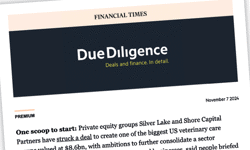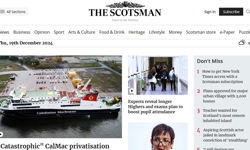Phil Creighton was so annoyed when Trinity Mirror closed its print products in Berkshire that he launched his own newspaper.
The death of the Reading Post and the Wokingham Times last December was part of what Trinity Mirror called a “bold, digital-only publishing transformation”. The company retained or recruited 11 out of 26 staff to focus on its GetReading.co.uk – serving news, features and sport to Reading, Wokingham, Bracknell and other nearby towns and villages.
But Creighton feels this has taken something away from local people, which he hopes to at least partly restore with the launch of The Wokingham Paper. And he prefers the word ‘experimentation’ rather than ‘transformation’ to describe Trinity Mirror’s project, as he feels it’s only closed newspapers to see if money can be made through an online-only brand.
Serving Wokingham
“People deserve something better, and that’s why I’ve launched my paper,” the 40-year-old maverick publisher tells me over a beer in The Gig House, the giant JD Wetherspoon pub in Wokingham. “There’s a tremendous sense of community here. There are regular and big community events – street fairs, a Christmas fair, concerts and festivals.
“Wokingham’s a market town that’s lively, bustling, friendly and also growing. Then there’s 154,000 people who live in the wider Wokingham borough, with another 13,000 homes planned in the next ten years. And it’s become a unique part of Berkshire because it’s not got its own newspaper.”
Creighton’s a hand-on newspaper enthusiast, only popping into the pub to meet me for an hour early on a Sunday evening in between photographing a summer music concert. Born and bred in Canterbury, he first came to Reading in 1996 to study typography and newspaper design at the local university.
He edited Spark, the student newspaper, which used to be printed at what was then the Reading Evening Post. This resulted in him becoming a trainee sub on the daily paper and, after a spell on The Baptist Times, he returned as features editor on the Post from 2007 to 2012, the paper turning weekly in 2009.
Creighton left the Post a second time to launch his own local magazine, but decided to return to newspapers when Trinity Mirror’s digital project left Wokingham with no printed title. He launched a pilot edition of The Wokingham Paper in March this year, starting regular weekly publication in April.
Priced at 50p, the new paper is already selling nearly 2,000 a week, with another 1,000 or so giveaways producing a circulation of around 3,000. And with the title now clocking up its 30th consecutive edition, Creighton claims this figure is slowly but steadily rising.
He says: “The Wokingham Times was selling 2,700 in the last ABC and giving away another 8,000. I’m fairly happy for our circulation to be not far off that figure after just six months. It’s very much about getting established in 2015, people taking to us, then building up our sales and our advertising. But we’ve got to box clever because we’re a small team, punching well above our weight.”
Managing costs
As well as himself, Creighton employs a chief sub, a reporter, a sports editor, a photographer, a photo-journalist and a part-time sports writer, plus advertising sales staff. He calls it a “small” team, but I suggest it’s quite a wage bill for a start-up, and he admits it’s sometimes been a struggle to cover costs.
Then he pulls out a recent edition and shows me £1,600-worth of advertising from Domino’s, which has a new pizza venue in Wokingham, and adds that there’s a half page of ‘public notices’ advertising going in next week, worth £1,000.
But while advertising is growing, Creighton agrees that certain bills have to be paid in full, often in advance, like the paper and printing costs. Distribution is via WH Smiths, which means cover price revenues are processed by the same company, with long delays before he gets the balance. And last of all come staff wages, which Creighton is reluctant to discuss in detail, while acknowledging that they’re not yet what they should be.
“Let’s just say that the staff are understanding of the difficulties in launching a new paper,” he says. “They’re all committed and believe in the importance of a printed newspaper for Wokingham, and they’re determined to see it through. They are being paid a certain amount, but they’re also investing their own time. And if, as and when we’re successful, they’ll be rewarded appropriately, possibly with shares in the company.”
Creighton, who’s yet to take any real wages himself, is determined to make The Wokingham Paper a success. But if big fish like Trinity Mirror feel it’s no longer worth publishing newspapers in Berkshire, how can his minnow hope to flourish?
Defiantly, Creighton says: “Websites are narrowcasting, newspapers are broadcasting. That’s one reason why I believe GetReading is going to struggle to cover community news. They’re only choosing to publish stories that get them digital clicks. Our offering is broader, printing everything the public wants to read.
“We’ve been a partner for the Wokingham Festival – the only media partner. We’re talking to a supermarket about a mass give-away one weekend. We’re raising awareness that we’re here. And once people see the paper, they’re generally bowled over.
“I’m a stickler for accuracy, and I genuinely believe we’ve got one of the best local newspapers in the country. And one of the strongest teams. We’re hungry. We’re a critical friend of the council. We want to serve the community, to be visible in the community and to celebrate the community.
“And we believe that Wokingham people are embracing us. Because print has an important part to play in every community. Pubs, churches, libraries and newspapers – all those things are the glue that bring us together. A website can’t do that because it’s preaching to the converted.”
Creighton pauses for thought, and adds: “There is some good journalism on GetReading. But I don’t believe it’s the be-all and end-all for local media in Wokingham. Because ultimately, they can’t satisfy little Joe’s mum who’s proud of her son’s picture in the paper. We can and we will.
“GetReading are quite bullish at how things are going for them but their web stats are bundled into the ‘regionals’ figures so it’s really hard to tell what they're actually doing.”
But will revenue streams ever become substantial and steady enough to keep The Wokingham Paper afloat and pay proper wages?
“Look, if it all goes tits up, I won’t have any regrets,” says Creighton. “And it won’t be because of the quality of the product. This is a litmus test for the future of news and how we consume it, and I believe there’s the need and space for a newspaper in Wokingham.”
Over at the Chronicle
The Reading Chronicle, another weekly paper, seems to be reaping benefits from Trinity Mirror’s closure of the Reading Post. Internal reports show that the Chronicle’s average sales from January to August rose by well over 50% compared to 2014, with growth some weeks as high as 70%.
The next official ABC audit is not due until February, but the leaked figures suggest as many as 2,500 local people who used to buy the Post now buy the Chronicle. That’s in addition to the 2,000-odd readers Creighton says buy his new Wokingham title.
First launched in 1825, the Chronicle was owned by the independent Romanes Media Group in recent years. But in May, Newsquest bought all Romanes’ titles, leading to a number of changes and several redundancies. This often happens as part of any takeover, but some observers – including this writer – feel care is needed not to spoil such a healthy sales position.
I put this view to Ian Murray, editor of the Southern Daily Echo in Southampton, who’s also Newsquest’s senior manager for Berkshire, but he politely declined to discuss the Chronicle while the above-mentioned changes are taking place.
Experiment or commitment?
Meanwhile, it has been reported that Trinity Mirror’s GetReading website clocked up more than one million unique users in August, with more than seven million page views. It sounds impressive, but does this mean it’s a commercial success?
David Higgerson, digital publishing director for Trinity Mirror Regionals, tells me GetReading is “one of Trinity Mirror’s best performing sites with growth in page views of more than 100%” and “local audience growth which regularly touches 200% year-on-year”. He says “daily unique growth” is “also up above monthly unique growth” which shows it’s “getting people back more often”.
But online jargon aside, is it making any money? Higgerson won’t reveal exact financial details, but adds: “Commercially, the site’s been well received both by new advertisers and ones we already had a relationship with.”
Are critics right to say that it’s just a digital-only ‘experiment’ to see if sustainable local news operations can be run online, without a newspaper?
Higgerson disagrees: “It isn’t an experiment to test a wider theory, it’s a serious business commitment to continue meeting the needs of advertisers and the demands of readers in Berkshire. By being the first, some will see it as an experiment, and we’ve already learnt things that we’ve fed into other newsrooms, but there’s a very real commitment to Reading.”
I push again on the financial side, but Higgerson won’t be drawn on the site’s profitability, nor on how long Trinity Mirror might wait for this to happen. He does say there are “no current plans” to launch similar digital-only projects in other areas.
But what about the competition? With around 4,500 former Reading Post and Wokingham Times readers now buying either the Reading Chronicle or The Wokingham Paper, was Trinity Mirror right to close its papers?
Higgerson says: “They’re competition only in the sense that we all cover the same areas, but we serve very different audiences … Audience data suggests we’re going in the right direction, and have the largest audience of any local media.
“That’s down to blending traditional newsroom skills – good contacts, local knowledge, strong news sense – with newer skills such as producing stories in the most engaging way online. Our team in Reading are doing a great job, and the feedback they get has been very positive.”
So Trinity Mirror’s digital-only product is booming, at least in terms of audience growth; sales at what is now Newsquest’s 190-year-old Chronicle are soaring; and the newcomer, The Wokingham Paper, is also on the verge of making a go of it.
Because Creighton’s new product seems the most precarious in terms of affordability, I contact him again just before deadline, to bluntly ask if The Wokingham Paper can continue for the foreseeable future.
“Yep, that’s the plan,” he tells me in early October. “It’s all starting to come together nicely and people like what we’re doing. We’re looking at expanding distribution, tightening up on our weak spots and experimenting more with the website – our Facebook interaction is already great. And I’m excited about 2016.”
If nothing else, the ongoing battle for Berkshire is proving that there’s still some life left in the old, battered local media sector.












